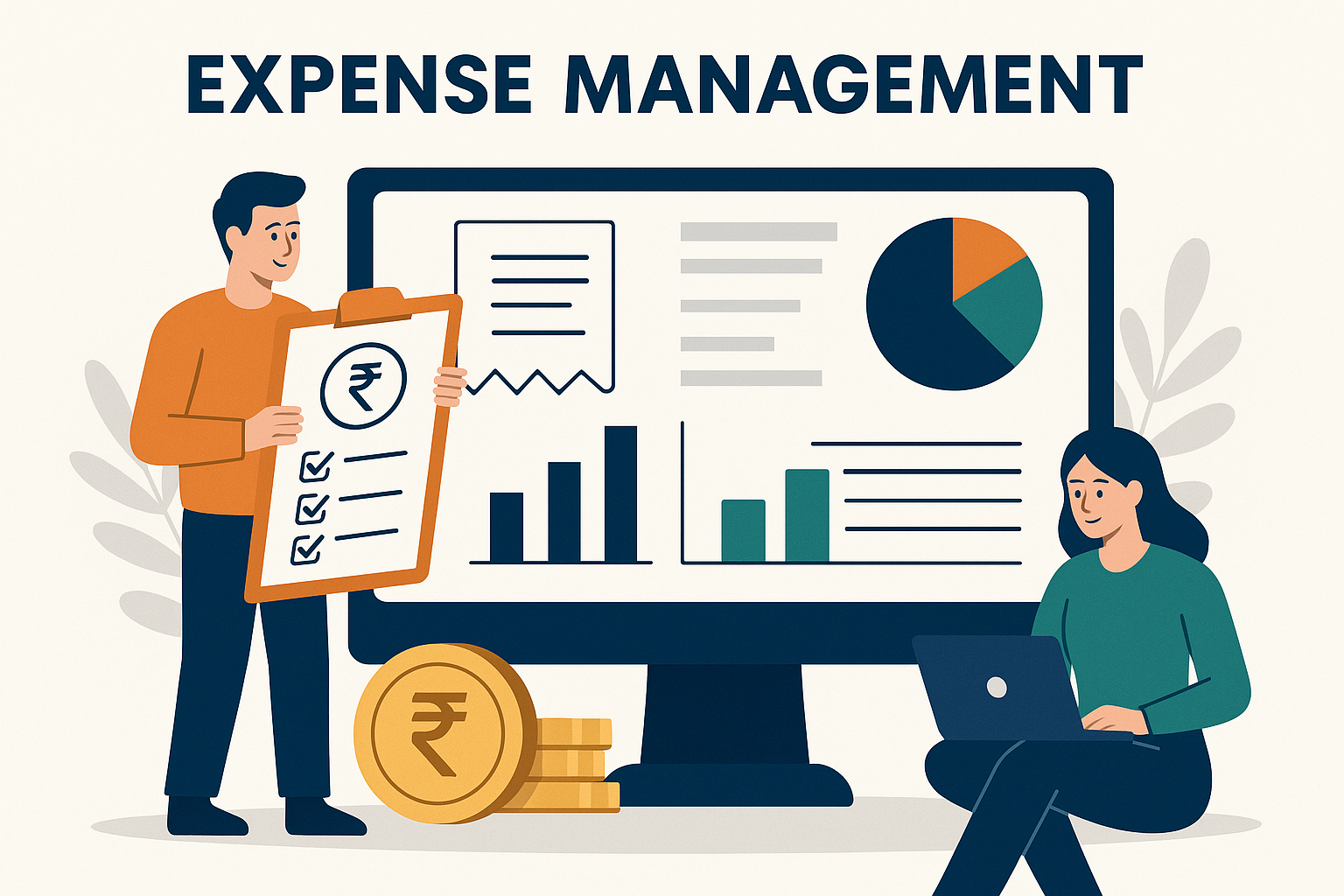Expense Management: A Complete Guide for Businesses in 2025

In today’Running a business today requires more than just selling products or services—it demands strict financial discipline. Every rupee spent, whether on office operations, employee reimbursements, or vendor payments, impacts the company’s bottom line. This is why expense management is one of the most crucial aspects of business operations in 2025.
Poorly managed expenses can eat into profits, restrict growth, and even lead to compliance issues. On the other hand, companies that implement effective expense management practices can optimize cash flow, strengthen financial control, and ensure long-term sustainability.
In this comprehensive guide, we’ll cover what expense management means, why it matters, common challenges, best practices, and emerging trends that businesses should know in 2025.
What is Expense Management?
Expense management is the process of tracking, analyzing, and controlling all business-related spending. It involves documenting expenses, categorizing them, ensuring compliance with policies, and approving reimbursements.
The scope of expense management is broad and includes:
- Employee Reimbursements – Travel, meals, lodging, and other work-related claims.
- Operational Costs – Utilities, rent, office supplies, and IT infrastructure.
- Vendor Payments – Goods and services purchased from third parties.
- Corporate Spending – Marketing, training, client entertainment, and events.
At its core, expense management provides organizations with:
- Visibility: Clear insights into where money is going.
- Control: Mechanisms to limit overspending and enforce rules.
- Efficiency: Faster approvals and smoother workflows.
- Compliance: Adherence to accounting standards, taxation laws, and internal policies.
Why Expense Management is Important
Many businesses underestimate how much uncontrolled expenses can affect their profitability. Here are some key reasons why expense management should be a top priority:
- Cost Control
Without proper tracking, small expenses often go unnoticed and add up significantly. Expense management ensures that every rupee is accounted for and prevents overspending. - Improved Cash Flow
By streamlining how expenses are recorded and reimbursed, businesses can better manage their working capital. This ensures funds are available for growth and emergencies. - Enhanced Transparency
Transparent processes eliminate confusion among employees and managers. Everyone knows what qualifies as a reimbursable expense and what does not. - Error & Fraud Reduction
A well-structured process reduces duplicate claims, false reimbursements, and manual errors. This protects the company from financial leaks. - Data-Driven Decision-Making
Expense data provides valuable insights into spending trends. Leaders can use this information to adjust budgets and allocate resources more strategically.
Common Challenges in Expense Management
Despite its importance, many companies struggle with expense management due to outdated practices or lack of awareness. Some common challenges include:
- Manual Paperwork: Collecting receipts and filling forms slows down reimbursement.
- Unclear Policies: Employees often don’t know what’s allowed and what’s not.
- Delayed Tracking: Expenses are recorded months later, leading to cash flow issues.
- Errors in Approvals: Human mistakes can cause duplicate or wrong entries.
- Departmental Overspending: Lack of budget discipline across teams creates imbalance.
Best Practices for Effective Expense Manage
- Establish Clear Policies
Companies should create detailed guidelines that define reimbursable and non-reimbursable expenses, approval hierarchies, and spending limits. Policies must be communicated clearly to all employees. - Encourage Real-Time Recording
Employees should be trained to submit expenses immediately instead of waiting until the end of the month. This ensures accuracy and avoids backlogs. - Digitize Records
Maintaining digital receipts, invoices, and approvals reduces paperwork, eliminates storage issues, and ensures quick retrieval during audits. - Set Departmental Budgets
Allocating specific budgets to each department prevents overspending and promotes accountability. Managers can then track how funds are being used. - Regular Expense Reviews
Conducting monthly or quarterly reviews helps businesses identify wasteful expenses and optimize processes. It also builds a culture of financial responsibility. - Promote Employee Awareness
Expense management is not just a finance team task. Employees should be made aware of policies, ethical practices, and the importance of accurate claims.
Expense Manage Trends in 2025
The landscape of expense management is evolving rapidly. Here are some trends that businesses should watch:
- Automation and Digitization
Manual paperwork is being replaced with digital processes. From receipt scanning to online approvals, companies are adopting systems that save time and reduce human error. - Real-Time Expense Monitoring
Businesses are moving away from quarterly reporting and shifting to real-time tracking, giving leaders instant visibility into financial health. - Policy-Driven Approach
Pre-defined rules and policies ensure compliance while reducing disputes between employees and finance teams. - Expense Data Analytics
Organizations are leveraging analytics to uncover spending patterns, negotiate better vendor deals, and forecast budgets more accurately. - Sustainability in Spending
Companies are becoming more conscious of environmentally friendly practices. Expense management is increasingly tracking eco-friendly choices, such as reducing paper usage or monitoring travel-related carbon emissions.
Expense Management in Startups vs Enterprises
While the core principles remain the same, the way expense management is handled varies with business size:
- Startups: Often operate with limited budgets, so strict control over every expense is crucial. Expense management focuses on survival and growth.
- Small & Medium Businesses (SMBs): The goal is efficiency and compliance. They need scalable processes that can grow with the business.
- Large Enterprises: With multiple departments and thousands of employees, the challenge lies in centralizing processes while allowing flexibility across units.
Understanding these differences helps businesses design systems that fit their scale and objectives.
Conclusion
Expense management is more than just a financial process—it’s a strategic business tool. Companies that track, control, and optimize their spending enjoy better cash flow, improved efficiency, and stronger growth prospects.
In 2025, businesses that adopt disciplined expense management practices will not only save money but also gain valuable insights for smarter decision-making. Whether you are running a startup or managing a large organization, focusing on expense management ensures that every rupee spent contributes to your long-term goals.
Simply put, good expense management means good business health.



